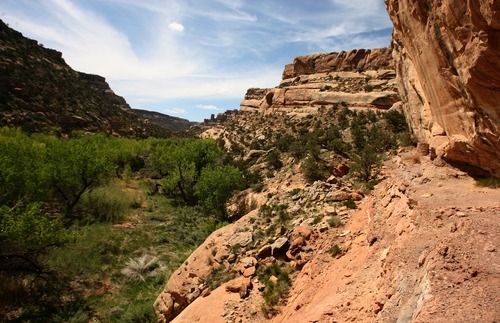This is an archived article that was published on sltrib.com in 2011, and information in the article may be outdated. It is provided only for personal research purposes and may not be reprinted.
Washington • In striking a last-minute deal to avert a government shutdown, Congress also found time to attack a few pet issues, including curbing the Interior Department's ability to begin categorizing federal acres as "wild lands."
Gray wolves in several states, including Utah, would also be dropped from the endangered species list, while the Central Utah Project would see spending cuts.
Those are some of the many small, but important, issues tucked into a massive measure to fund the government for the next six months. Details of the plan hashed out at the end of last week trickled out Tuesday.
Western Republicans have been looking for any opportunity to overturn, or block, Interior's wild lands policy, which essentially sidesteps a previous agreement to allow the Bureau of Land Management to select and protect public lands deemed to have wilderness characteristics.
The budget bill halts Interior from spending any taxpayer money on the policy.
U.S. Rep. Rob Bishop, R-Utah, said the policy, announced in December, would lock up millions of acres of public lands — mainly from oil and gas drilling and recreational use — and "destroy thousands of jobs."
"The creation of new de facto wilderness throughout the West would be severely detrimental to state and local economies and create a paralyzing uncertainty for Western communities," Bishop said Tuesday.
The budget measure provided the right vehicle to halt the plan, Bishop added.
Interior Secretary Ken Salazar's office declined comment on the budget language.
Heidi McIntosh, associate director of the Southern Utah Wilderness Alliance, said the congressional move won't repeal the federal law that requires BLM officials to inventory and protect wilderness. But she said Congress' action is totally unrelated to the budget.
"The wild lands policy rider, of course, has nothing to do with the budget," McIntosh said. "It's a result of an extreme outlook that attempts to force BLM to favor oil and gas and off-road vehicles over the quiet and solitude of wilderness, and it ignores the fact that wilderness is, and always has been, one of many multiple uses."
The spending measure, which the House and Senate must take up this week, also drops the gray wolf from protection under the Endangered Species Act in Utah, Idaho, Montana, Oregon and Washington. Western Republicans, and some Democrats, have pushed to let the states manage the wolf population.
If wolves are no longer a protected species in Utah, the state could kill animals that attack livestock and repay ranchers for losses to their herds, said Kevin Bunnell, a program coordinator with the Utah Division of Wildlife Resources.
No wolf packs are currently roaming northern Utah, but Bunnell said more than a dozen individual wolves have been spotted in the state and more are likely to come.
Utah established a wolf policy in 2006, but it hasn't been able to put it in place because of the endangered species designation.
The wolf provision in the budget bill ticked off some environmental groups, which charged that wolves have nothing to do with cutting spending.
"Wolves deserve protec-tions just like every other species, and it's a tragedy that they've been thrown under the bus for political reasons," said Trip Van Noppen, president of the nonprofit environmentalist law firm Earthjustice. "By law, lifting federal endangered species protections is supposed to be based solely on biology, not politicians enacting their political judgment. Let the wildlife experts do their jobs. Keep politics out of wildlife management."
The Central Utah Project, a decades-long effort to bring water from Utah's eastern mountains over and through the Wasatch Mountain range, would face an $11 million cut under the budget bill beyond the $9 million hit it took under President Barack Obama's budget proposal. That would leave about $20 million for the project.
Christine Finlinson, government-affairs director at the Central Utah Water Conservancy District, said the cuts appear to target construction projects along Utah Lake.
"Of course, we are disappointed in that, but we are grateful that there is money in the budget at all," she said.
Richard Bay, general manager of the Jordan Valley Water Conservancy District, has said the portion of the Central Utah Project water expected in Salt Lake County — about 30,000 acre-feet — would provide enough water each year to serve 45,000 households, or more than 140,000 people.
Sen. Orrin Hatch, R-Utah, said cutting the budget means hard decisions — but that it has to be done.
"In these difficult economic times, I recognize that cuts have to be a reality, even for programs that I support," Hatch said. However, his office says he is still weighing whether to support the budget measure.
Sen. Mike Lee's spokesman says the senator is likely to oppose the spending bill because it doesn't significantly address the deficit or debt.
Rep. Rob Bishop is expected to support the deal, but Rep. Jason Chaffetz says he opposes it and previously voted against a one-week budget extension because it didn't cut enough spending. Rep. Jim Matheson's office didn't respond to a question of whether he would back the budget measure.
Chaffetz had joined with other House Republicans to find budget line items that should be cut, and he has pushed to strip funding from two: The U.S. Institute of Peace and the International Fund for Ireland.
Under the budget measure, the peace institute would see $7 million less than what Obama requested for it, while the Ireland fund would receive nothing — a $17 million cut.
Utah impacts
The budget-cutting deal to keep the government running will have some big impacts on Utah, from halting a new wild lands policy to shaving funds for completing the massive Central Utah Project that would supply water for tens of thousands of people in Salt Lake County.



